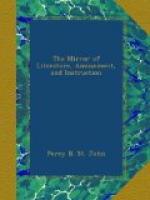in many instances to the letters of the martyrs themselves;[15]
of all which documents, says Strype, he has been found,
by those who have compared his books with his authorities,
to have made a faithful use. He lived many years
after his first edition was published, which was in
1563, and in the interval laboured to render it still
more perfect; suppressing where he found reason to
doubt, as in the story of Cranmer’s heart remaining
unconsumed when the rest of his body was reduced to
ashes;[16] enlarging where he was furnished with fresh
matter which he thought trustworthy, as in the story
of Gardiner’s being stricken with sickness on
the day of Cranmer’s martyrdom;[17] and taking
journeys in order to confront witnesses and sift evidence
when his facts chanced to be called in question;[18]
such was his industry. But, independently of
all knowledge of this, his pains-taking, the internal
evidence of the book is enough to establish its general
good faith. There is a simplicity in the narrative,
particularly in many of its minute details, which
is beyond all fiction; a homely pathos in the stories
which art could not reach. Sometimes an expression
casually drops out which suffices to prove the testimony
to be that of an eye-witness; thus, where the terrible
death of Ridley is described, the martyrologist speaks
in general in his own person; yet we read, that “after
the legs of the sufferer were consumed by reason of
his struggling through the pain, he showed that side
toward us clean, shirt and all untouched with
flame,” as though the informant (whose words
the historian had here neglected to accommodate) had
been himself the spectator. Sometimes there is
a frank confession of ignorance, where a less scrupulous
writer would have been under a great temptation to
supply the defect of information by conjecture; thus,
in the details of the same execution of Ridley and
Latimer, it is observed, that after they rose from
their knees the one talked with the other a little
while, but what they said, adds Fox, “I can
learn of no man.” Above all, there is such
candour in the developement even of his most favourite
characters, their failings as well as their virtues
so fairly told, that it is plain they have not been
packed. Thus it is by him we are taught that
Cranmer moved the King to the execution of Joan of
Kent, though Cranmer’s general disposition would
seem repugnant to such an office, and though no mention
is made in Edward’s Journal of any such interference,
or, indeed, of any reluctance on his own part which
should render it needful: thus of Latimer, he
does not conceal that he probably subscribed on one
occasion certain articles which the bishops presented
to him, of fear rather than of conscience;[19] and
of Hooper, his favourite, if he had one among the
martyrs, that he disputed too pertinaciously, and
to the breach of mutual charity, with his opponents
on the subject of the episcopal habits, and that the
prospect of their approaching death for the common




